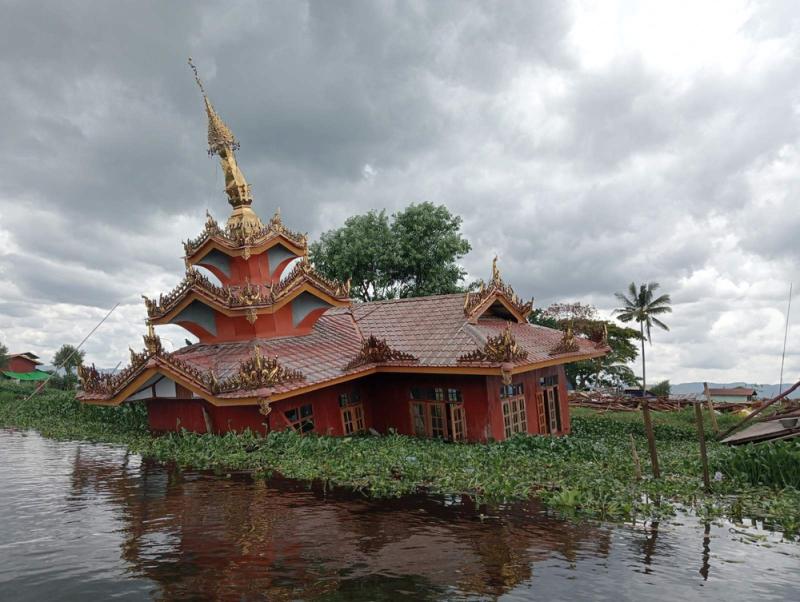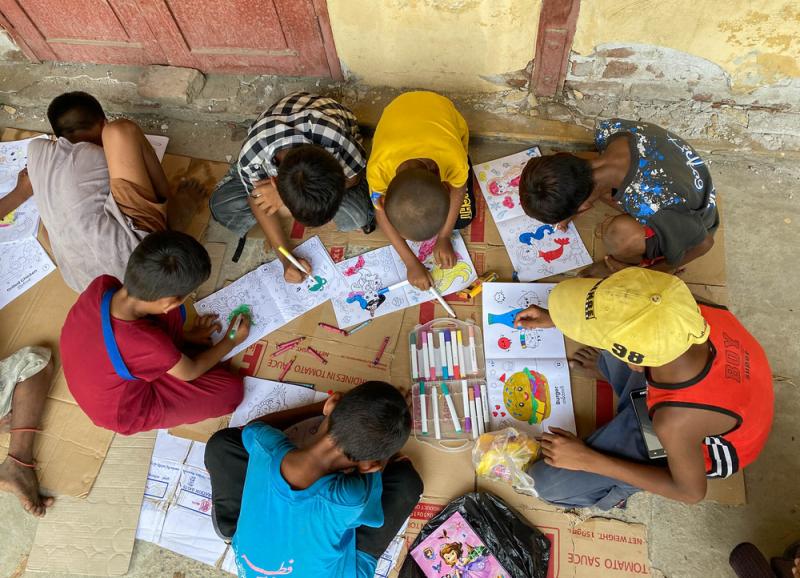Devastating earthquake hits Myanmar: Impact, response, and ongoing relief efforts
On 28 March, a 7.7-magnitude earthquake hit Myanmar. The epicentre was recorded at Sagaing with a depth of 10km. However, the tremor was felt across Thailand, Bangladesh, China, and Laos, causing widespread damage to infrastructure and buildings.
As of 8 April 2025, official figures reported over 3,600 deaths, more than 5,000 injured, and 15 million people severely affected. The earthquake has created a crisis in a crisis.
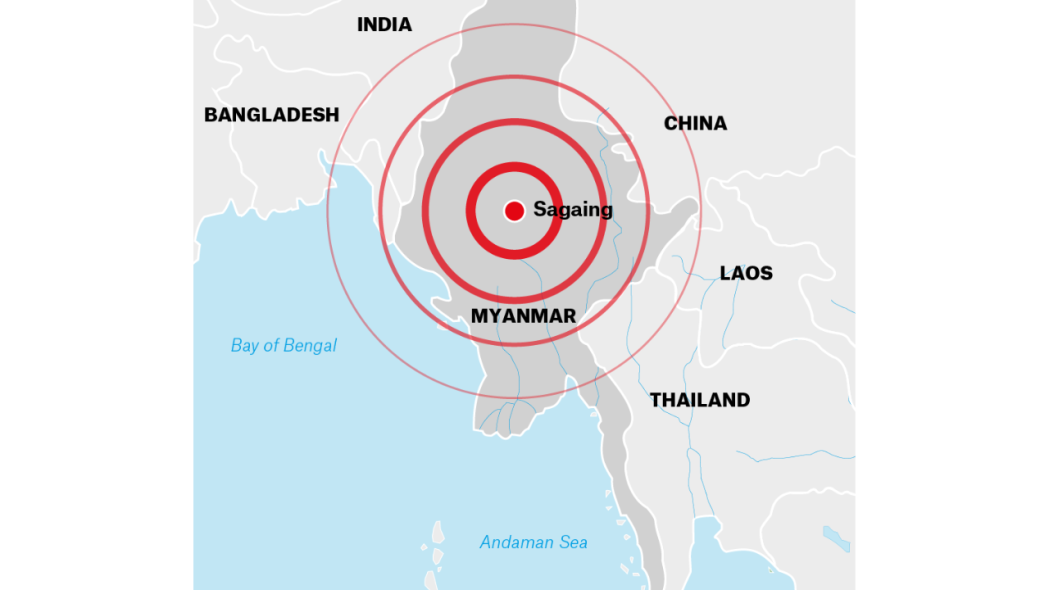
Urgent needs reported in the aftermath of the earthquake
- Water and sanitation: With domestic sanitation systems heavily damaged, there is an urgent need for safe drinking water to help prevent potential disease outbreaks.
- Health: Several medical facilities have been damaged, and ongoing power outages are impacting hospital operations. Various emergency teams are mobilizing support, while the risk of waterborne diseases continues to rise.
- Housing: Urgent need for safe and context-appropriate housing as displaced populations in makeshift shelters face worsening conditions with the upcoming monsoon and cyclone season.
- Medical supplies: Myanmar has a strong workforce of well-trained medical professionals, but there is a critical shortage of essential medical supplies and equipment.
- Protection & mental health: There are concerns about children being separated from their families and experiencing emotional stress. Support for survivors of gender-based violence (GBV) includes hygiene kits, and emergency help.
Will you support us?
Support our emergency work in Myanmar and in over 70 countries.
How is Doctors Without Borders responding to the earthquake in Myanmar?
Right now, our goal is to support people affected by the crisis by providing safe drinking water, clean toilets and sanitation, temporary shelter, basic household items, mental health support, and medical care.
Needs assessments are still ongoing in some areas, and our teams remain flexible—adjusting their activities based on the evolving needs of affected communities.
MANDALAY CITY AND MANDALAY REGION
- Water and sanitation
In Mandalay, our teams have made substantial progress in improving water, sanitation, and hygiene (WASH) conditions in hospitals and displacement camps across surrounding villages.
Efforts included restoring access to clean water, sanitation, and electricity in earthquake-damaged health facilities serving displaced populations and rural communities. This included the drilling of borewells to secure long-term water access. In Ba Le Ba village alone, home to 475 families, our team successfully restored 140 water sources.
- Waste management and heat
To support proper waste management, we have installed dozens of waste bins and are actively working on improving solid waste disposal. A thorough assessment of the waste collection area has been carried out to implement a more structured and efficient waste management system.
- Non-food item distribution:
In Mandalay city and across the Mandalay region, our team has distributed non-food item (NFI) kits to over 2,000 families affected by the earthquake.
- Medical care:
To improve access to healthcare for earthquake-affected communities, temporary mobile clinics have been deployed in over eight locations across Mandalay city and Mandalay region. Doctors Without Borders also support the restoration of essential services in damaged health facilities, including tuberculosis (TB) care.
In addition, teams are conducting disease surveillance to support outbreak prevention and response efforts for preventable diseases such as cholera, dengue, and malaria.
- Mental health:
Doctors Without Borders is expanding mental health support at the community level by training over 200 volunteers, including professors, teachers, medical students, doctors, and nurses, in Psychological First Aid (PFA). These trained volunteers are now providing PFA, individual counseling, and group therapy sessions for children in earthquake-affected communities.
- Health facility rehabilitation:
Doctors Without Borders teams are supporting earthquake-damaged hospitals with critical logistical assistance. In Tada-U Hospital for example, we provided a large medical tent to accommodate patients and donated 10 hospital beds.
Additionally, fans have been installed in key areas of the temporary shelters to enhance air circulation and provide relief for patients affected by extreme heat, which can reach up to 40°.
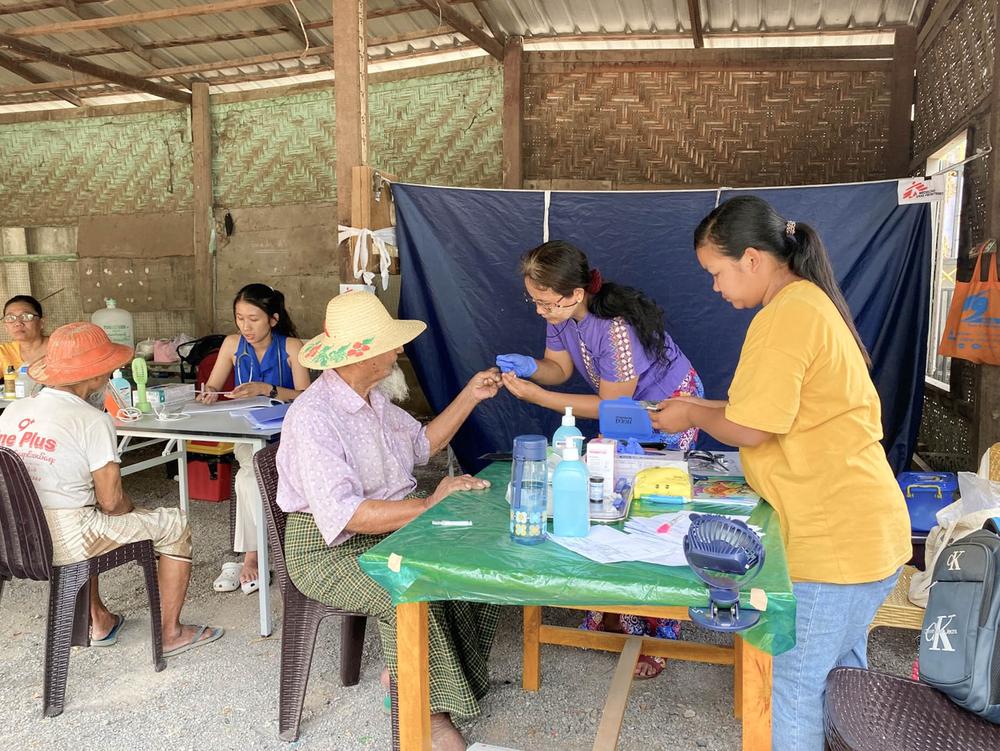
A patient visited our mobile clinic for a check-up on his blood pressure and insulin levels. He was inside a mosque when the earthquake struck and managed to escape after being hit by falling debris. Myanmar, April 2025. © MSF
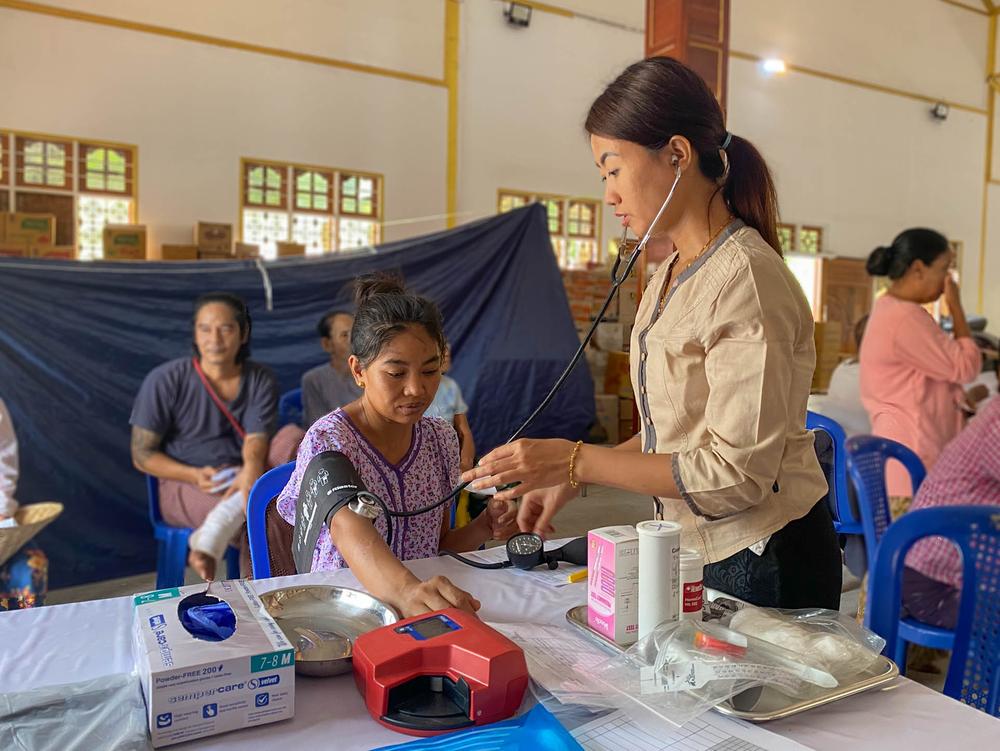
During our mobile clinic in the Tada-U monastery, a midwife checks on an earthquake survivor who lost her husband and nearly lost her son. Still coping with trauma, she struggles with anxiety and a fear of the dark. Myanmar, April 2025. © MSF
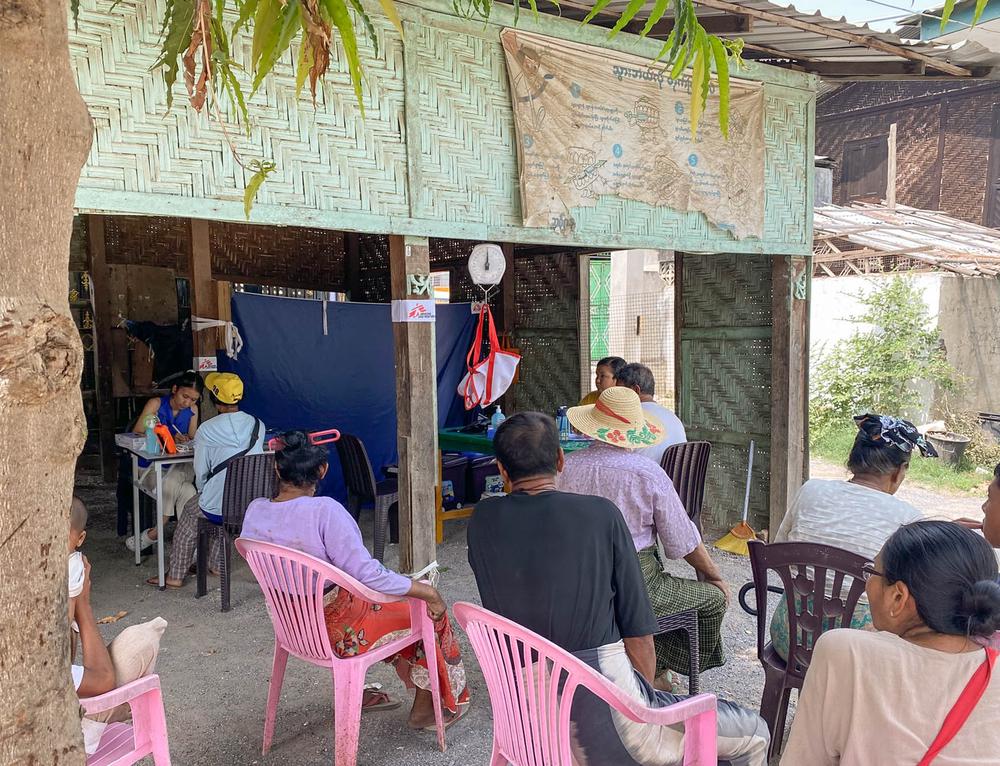
Patients wait at the mobile clinic in Bhone Oh camp, Mandalay. The teams offer medical consultations for non-communicable diseases and mental health. Myanmar, April 2025. © MSF
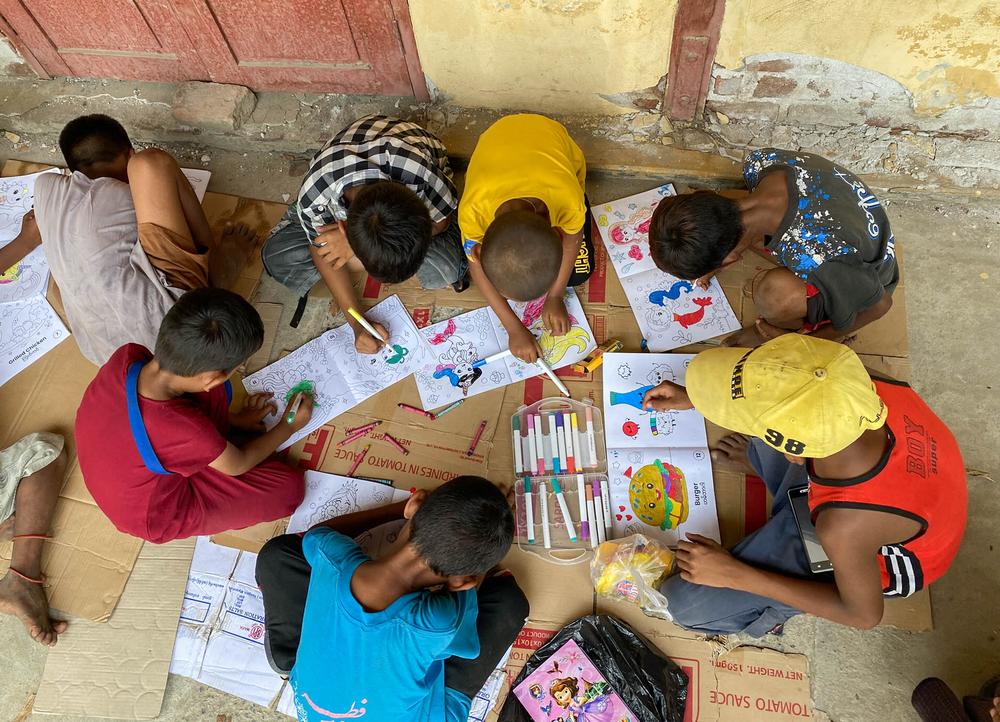
A mental health session for children: drawing together, and acknowledging each other’s creativity and effort during our mobile clinic in Bhone Oh camp, Mandalay. Myanmar, April 2025. © MSF
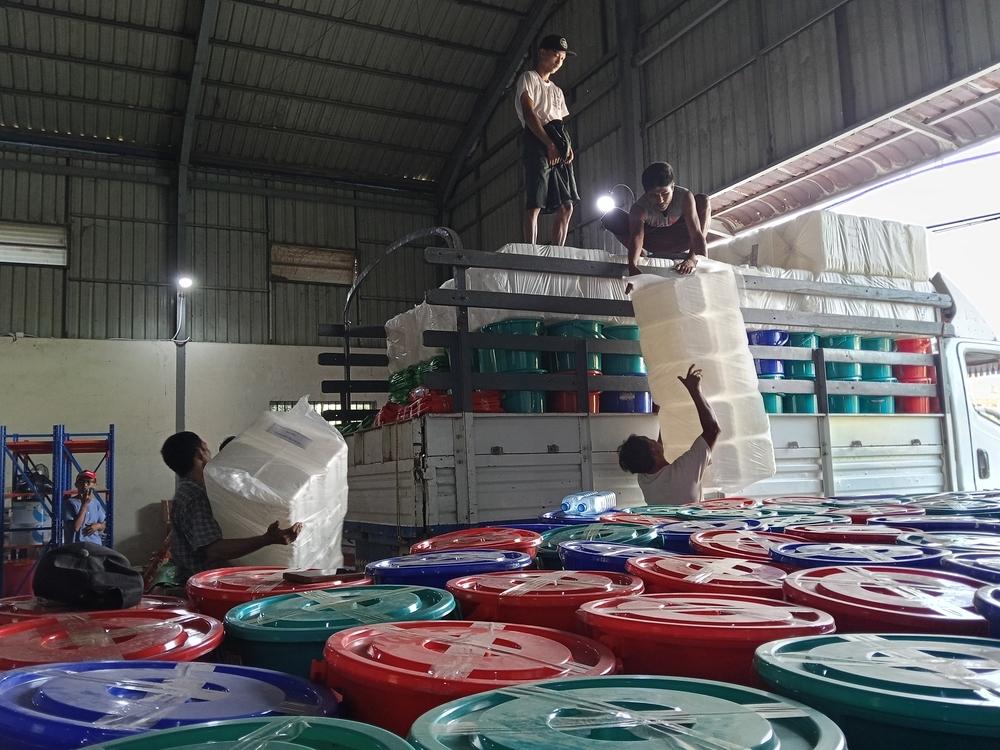
Two trucks are loaded with non-food item kits at our warehouse in Mandalay. Each kit includes essentials such as blankets, tarps, mosquito nets, hygiene items, and household supplies. Myanmar, April 2025. © MSF
SOUTHERN SHAN, INLE LAKE
- Medical care and health promotion:
Doctors Without Borders’ mobile clinics are reaching four villages, providing essential healthcare services and referring patients to higher-level care when needed. In addition, our teams are actively conducting health promotion and education campaigns focused on hygiene practices and disease prevention.
We have also delivered infection prevention and control (IPC) training to staff at three referral hospitals to strengthen overall healthcare safety and preparedness.
- Mental health:
Our teams are providing community-based mental health care through Psychological First Aid (PFA) to support individuals affected by the earthquake.
- Water and sanitation:
Doctors Without Borders teams have repaired water treatment units, including reverse osmosis and surface water systems, and restored power supply to affected areas.
Additionally, the teams carried out repairs on community latrines and boreholes to improve access to safe water and sanitation.
- Shelter and non-food item distribution:
In the region, Doctors Without Borders teams distributed essential shelter materials—including bamboo, wood, nails, and hammers—to support families in rebuilding. Hygiene non-food item (NFI) kits were also provided to help improve sanitation and prevent disease.
SAGAING CITY
- Medical care:
Mobile clinics in Sagaing city are delivering basic healthcare services in two locations, including treatment and follow-up care for patients with non-communicable diseases (NCDs) such as diabetes and hypertension
- Mental health:
In Sagaing City, Doctors Without Borders teams are providing mental health support through Psychological First Aid (PFA), group therapy sessions for children, and individual counseling for adults affected by the crisis.
- Swift access to affected areas critical
From Paul Brockmann, operations manager for Myanmar, Bangladesh and Malaysia of Doctors Without Borders:
"Our medical humanitarian staff in Myanmar and neighboring countries have the capacity to respond at scale to the needs of affected communities as soon as authorities facilitate swift and unhindered access for teams to do assessments and provide medical care.
Given the scale and intensity of the earthquake, the impact on people could be devastating, particularly for those who require immediate lifesaving assistance due to trauma injuries. We’re also concerned about those who will be vulnerable after losing shelter, access to general health care, and safe drinking water, which is crucial to control the possible spread of waterborne diseases.
The ability to deploy assessment teams and, ideally, surgical capacity, are critical in the first hours and days after any earthquake if we hope to respond with life and limb-saving surgical care for people injured.
To enable an effective response, swift access to affected areas and timely approval of essential supplies and personnel are critical."
- Complicated situation due to ongoing conflict
From Federica Franco, head of mission of Doctors Without Borders in Myanmar:
"While we are not in the areas that have been most impacted by the earthquake, all of our teams in the country really felt it, and all of our offices were also evacuated. It was a particularly long [earthquake], to be honest, which is also why it was scary for a lot of us.
Thankfully, all of our staff are safe, but we are deeply concerned about the people in the affected areas. At this time, it's quite hard to fully grasp the extent of the damage.
The situation is very complicated because there are significant communication blackouts in some of the hardest hit areas, and this is due to the ongoing conflict."
- Environmental impacts due to imminent rainy season
As Myanmar enters the rainy season, logistical challenges for ongoing earthquake response efforts are expected to intensify—especially in already hard-hit areas. Heavy rainfall could trigger flooding, landslides, and additional infrastructure damage, making it even more difficult to reach remote or vulnerable communities. At the same time, extreme heat with temperatures exceeding 40°C continues to pose serious health risks.
Challenges amid ongoing response
Given the scale and intensity of the earthquake, the impact on people who require emergency trauma care for crush injuries can be devastating.
We’re also concerned about people made vulnerable as a result of losing access to shelter, health care, and drinking water. Prompt medical aid efforts are crucial to control the spread of waterborne, vector-borne, or endemic diseases.
Will you support our emergency response work?
Help us provide lifesaving medical care during emergencies by making a donation today.
-17dc1.jpg?h=c673cd1c&itok=OnBOnUBO)
